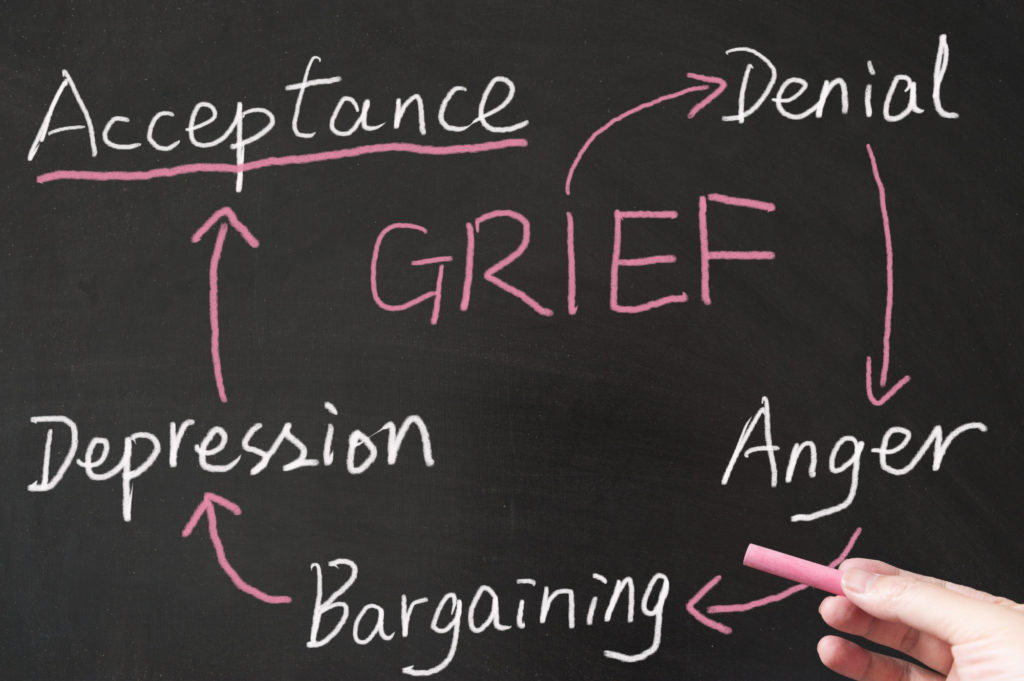The shock, anger, and sadness of grief can be an emotional roller coaster.
It’s one of the hardest things we go through in life. However, there may be comfort in knowing that you’re not alone, as grief and loss is something we all go through.
To help others understand the process, psychiatrist Elizabeth Kübler-Ross published “On Death and Dying”, based on her work with terminally ill patients.
It outlined the five stages of grief that most of us experience. What are the five stages of grief and how can we expect to feel?
Keep reading to find out, along with ways you can support yourself or a loved one through the grieving process.
1. Denial— the First of Five Stages of Grief
Denial is a coping mechanism of those who are experiencing or have experienced, a loss.
In the denial stage, people may pretend it hasn’t happened. They may tell themselves the person’s medical results were wrong, that it isn’t final, or that things will change.
Loss is a massive shock to the system and changes our complete sense of reality. So, it’s not surprising that denial is something many experience as they aren’t emotionally ready or prepared to handle the terrible news.
They may be trying to make final arrangements, looking for affordable burial and cremation, and tending to the estate of the loved one. It can be mentally exhausting to deal with and hard to make sense of it all.
It’s important to note that denial comes first in the grief cycle, although the stages can occur in any order, as everyone reacts differently.
2. Anger
When the reality sets in of the loss, anger can start to occur. Although it doesn’t always seem rational, the loss of a loved one is such a traumatic experience that it’s perfectly normal to become angry.
Anger may be directed at the deceased for leaving you, at their medical care team for not saving them, or even at God for allowing the situation to occur.
Anger can also show up as resentment, bitterness, or frustration towards others. It can also sometimes cause people to lash out at others, self-harm, or cope with drugs or alcohol.
If you are feeling angry, depressed, or finding it hard to cope at any stage of the grief process, grief counseling or support are always a good idea. Contact Mental Health America to find resources and support near you.
Or, browse your local library for books on grief, as it can be helpful to read and learn from the experiences of others.
3. Bargaining
Bargaining is the next step in the grief cycle. In the bargaining phase, we tend to feel hopeless and desperate and may resort to ‘what if’ thoughts.
The person is trying to come up with ways in which the person could have lived longer, such as ‘What if we’ve gotten a second opinion from a doctor?’ or ‘What if we’d gone to a different hospital’?
Sometimes the bargaining is also directed towards God, with the idea that we will somehow change or improve our lives if the person could be brought back.
In bargaining, you may be trying to come up with an explanation for why the death happened, as a way to avoid the reality of the situation.
Those in the bargaining stage may also feel guilty, as if it’s somehow their fault for the person passing away. If you feel this way, speaking to a therapist or a loved one can be helpful, as it’s important to know that nothing you did is responsible for what happened.
4. Depression
Depression and feelings of isolation are a major part of the grief cycle and can last quite a long time.
Once the reality has set in, you may start to miss the deceased person greatly, and you may withdraw from friends and family, preferring to cope alone.
Although this is natural, try not to isolate yourself too much, as it can have a negative impact on your mental health. It can feel overwhelming, incredibly sad, and may impact your sleep or productivity.
Bereavement support groups can be helpful in this situation, as they allow you to connect with others, share stories, and listen and support one another.
If someone you know appears to be in the depression stage, reach out to them and see what you can do. Sometimes, a simple hug or a cup of coffee can make a big difference to someone who is struggling.
5. Acceptance
Acceptance is the final stage of grief, meaning that you have accepted reality and are able to cope. It doesn’t mean you’re ok with what happened or that you’re happy again, but you’ve reached a place where you’re able to function and live again.
In the acceptance stage, you may feel calmer or at peace and have given up trying to fight the situation in your mind.
Unfortunately, some people never fully reach the acceptance phase, especially in the case of a sudden death or loss of a child.
Even in the acceptance stage, you still may go through periods where you feel anger, sadness, or depression, as it’s normal to jump back and forth between the various stages.
You Will Get Through This
Are you or is someone you love going through the stages of grief? If so, you know that it can be a confusing, heartbreaking, and difficult time in life.
When you’re experiencing grief, make sure you look after yourself. Spend time with loved ones, or in solitude, if it helps, speak to a therapist, and make an effort to look after your mental health.
It’s a sad part of life, but over time, things will slowly start to get easier.
Did you find this article helpful? If so, please browse some of our additional content.
